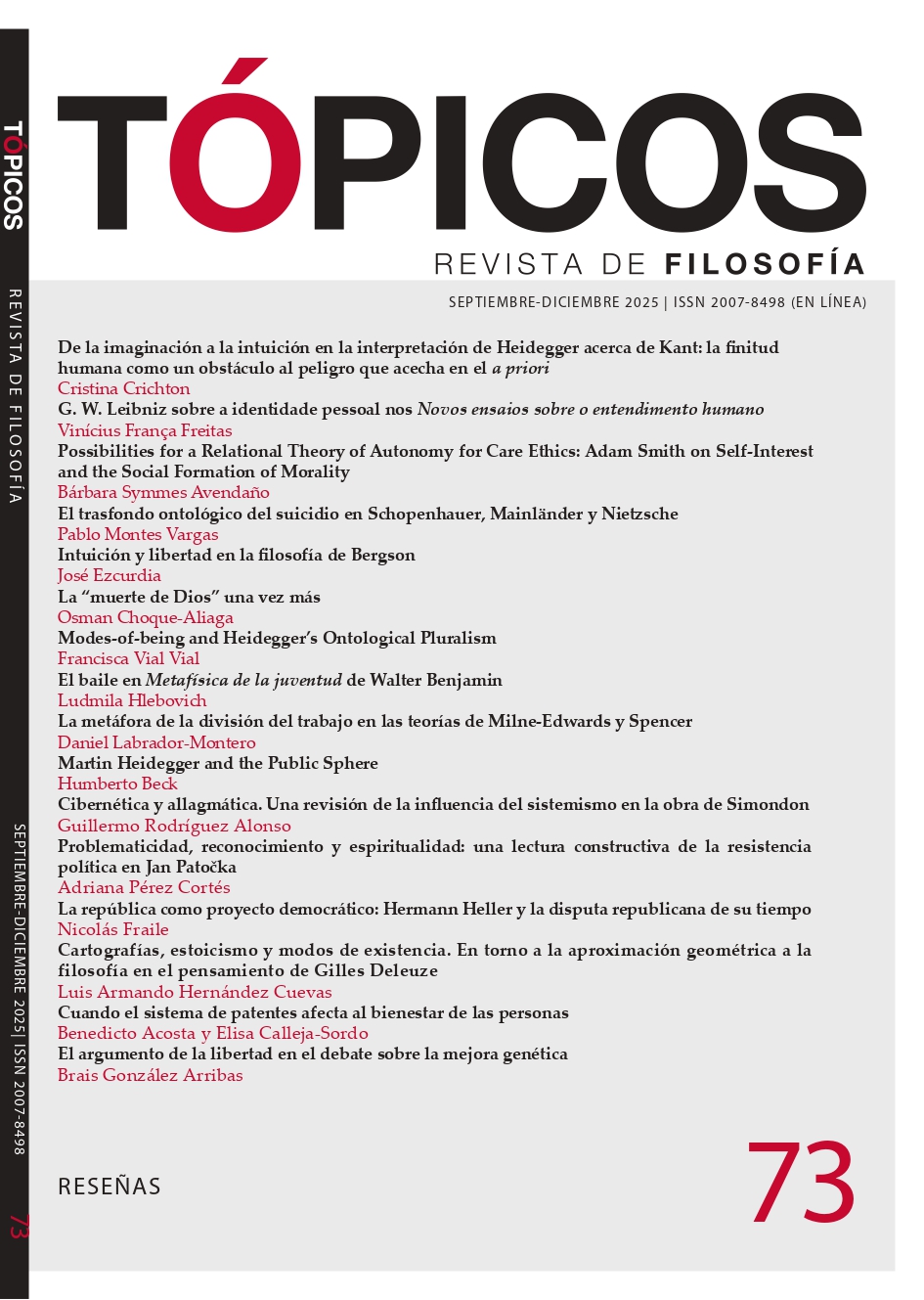Posibilidades para una teoría relacional de la autonomía para la ética del cuidado: Adam Smith en cuanto al interés personal y la formación social de la moralidad
Publicado 2025-08-01
Palabras clave
- Adam Smith,
- autonomía,
- autonomía relacional,
- Carol Gilligan,
- derechos individuales
- ética,
- ética del cuidado,
- interés personal,
- justicia,
- simpatía ...Más
Derechos de autor 2025 Tópicos, Revista de Filosofía

Esta obra está bajo una licencia internacional Creative Commons Atribución-NoComercial-SinDerivadas 4.0.
Cómo citar
Resumen
Aunque Smith no hace referencia explícita a la autonomía, se ha argumentado que en el individuo smithiano hay un lugar para la agencia y la autodeterminación, tal como se retrata en la Teoría de los sentimientos morales. En este artículo, sostengo que la perspectiva smithiana sobre la acción moral abarca el interés personal y una perspectiva relacional de la formación de la moralidad como componentes integrales de la autonomía. Esta conceptualización guarda similitud con la noción de “autonomía relacional” de la ética del cuidado. En Smith, la moralidad es un producto de las interacciones sociales facilitadas por el proceso simpatético y el espectador imparcial, que llevan a los individuos a emerger como sujetos morales. La interacción de la simpatía, el interés personal, la sociedad y la concepción del individuo delineada en la TMS podría proporcionar una base sólida para una teoría de la autonomía relacional que integre lo social, como propone la ética del cuidado, y que no sacrifique la justicia ni los derechos individuales.
Descargas
Referencias
- Ainsworth, M. & Bowlby, J. (1991). An Ethological Approach to Personality Development. American Psychologist, 46(4), 333-341. https://doi.org/10.1037/0003-066X.46.4.333
- Baier, A. (1985). Postures of the Mind: Essays on Mind and Morals. University of Minnesota Press.
- Barry, B. M. (1975). The Liberal Theory of Justice: A Critical Examination of the Principal Doctrines in “A Theory of Justice” by John Rawls. Clarendon Press.
- Carrasco, M. A. (2012). Adam Smith: Self-Command, Practical Reason and Deontological Insights. British Journal for the History of Philosophy, 20(2), 391-414. https://doi.org/10.1080/09608788.2012.665351
- Carrasco, M. A. (2024). Individualismo simpatético: justicia y cuidado en el liberalismo de Adam Smith. Estudios Públicos, 2, 193-212. https://doi.org/10.38178/07183089/1442240502.
- Christman, J. (2020). Autonomy in Moral and Political Philosophy. In E. N. Zalta (ed.), The Stanford Encyclopedia of Philosophy. https://plato.stanford.edu/archives/fall2020/entries/autonomy-moral/>
- Cuevas Moreno, R. (2009). La ética y economía en la obra de Adam Smith. La visión moral del capitalismo. Primera parte. Ciencia y Sociedad, 35(1), 52-79. https://www.redalyc.org/pdf/870/87014565003.pdf
- Darwall, S. (1998). Empathy, Sympathy, Care. Philosophical Studies: An International Journal for Philosophy in the Analytic Tradition, 89(2/3), 261-282. https://doi.org/10.1023/A:1004289113917
- Edwards, S. (2023). The Chile Project: The Story of the Chicago Boys and the Downfall of Neoliberalism. Princeton University Press. https://doi.org/10.1353/book.112152
- Fleischacker, S. (2019). Being Me Being You: Adam Smith and Empathy. The University of Chicago Press. https://doi.org/10.7208/chicago/9780226661926.001.0001
- Forman-Barzilai, F. (2010). Adam Smith and the Circles of Sympathy: Cosmopolitanism and Moral Theory. Cambridge University Press.
- Frankfurt, H. G. (1971). Freedom of the Will and the Concept of a Person. The Journal of Philosophy, 68(1), 5-20. https://doi.org/10.2307/2024717
- Friedman, M. (2008). Care Ethics and Moral Theory [Review of The Ethics of Care, by Virginia Held]. Philosophy and Phenomenological Research, 77(2), 539-55. https://doi.org/10.1111/j.1933-1592.2008.00205.x
- Gilligan, C. (2003). In a Different Voice: Psychological Theory and Women’s Development. Harvard University Press.
- Griswold, C. L. (1999). Adam Smith and the Virtues of Enlightenment. Cambridge University Press. https://doi.org/10.1017/CBO9780511608964
- Held, V. (2006). The Ethics of Care: Personal, Political, and Global. Oxford University Press. https://doi.org/10.1093/0195180992.001.0001
- Held, V. (2014). The Ethics of Care as Normative Guidance: Comment on Gilligan. Journal of Social Philosophy, 45(1), 107-15. https://doi.org/10.1111/josp.12051
- Herzog, L. (2016). Adam Smith and Modern Ethics. In R. Hanley (ed.), Adam Smith. His Life, Thought and Legacy (pp. 340-353). Princeton University Press. https://doi.org/10.2307/j.ctvc77g77.25
- Hurtado, J. (2016). Adam Smith’s Impartial Spectator: Autonomy and Extended Selves. Econ Journal Watch, 13(2), 298-305. https://econjwatch.org/articles/adam-smith-s-impartial-spectator-autonomy-and-extended-selves
- Keller, J. (1997). Autonomy, Relationality and Feminist Ethics. Hypatia, 12(2), 152-164. https://doi.org/10.1111/j.1527-2001.1997.tb00024.x
- Kopajtij, L. (2020). Adam Smith’s Sentimentalist Conception of Self-Command. In F. Forman (ed.), The Adam Smith Review. Volume 12 (pp. 7-27). Routledge. https://doi.org/10.4324/9781003056744-3
- Mackenzie, C. & Stoljar, N. (2000). Relational Autonomy: Feminist Perspectives on Autonomy, Agency, and the Social Self. Oxford University Press. https://doi.org/10.1093/oso/9780195123333.001.0001
- Meyers, D. T. (1989). Self, Society, and Personal Choice. Columbia University Press.
- Noddings, Nel. (2013). Caring: A Relational Approach to Ethics and Moral Education. University of California Press.
- Raphael, D. D. & A. L. Macfie. (1982). Introduction. In A. Smith, The Theory of Moral Sentiments (pp. 1-52). Liberty Classics.
- Smith, A. (1981a). An Inquiry into the Nature and Causes of the Wealth of Nations. Volume I. R. H. Campbell & A. S. Skinner (eds.). Liberty Classics.
- Smith, A. (1981b). An Inquiry into the Nature and Causes of the Wealth of Nations. Volume II. R. H. Campbell & A. S. Skinner (eds.). Liberty Classics.
- Smith, A. (1982). The Theory of Moral Sentiments. D. D. Raphael & A. L. Macfie (eds.). Liberty Classics.





